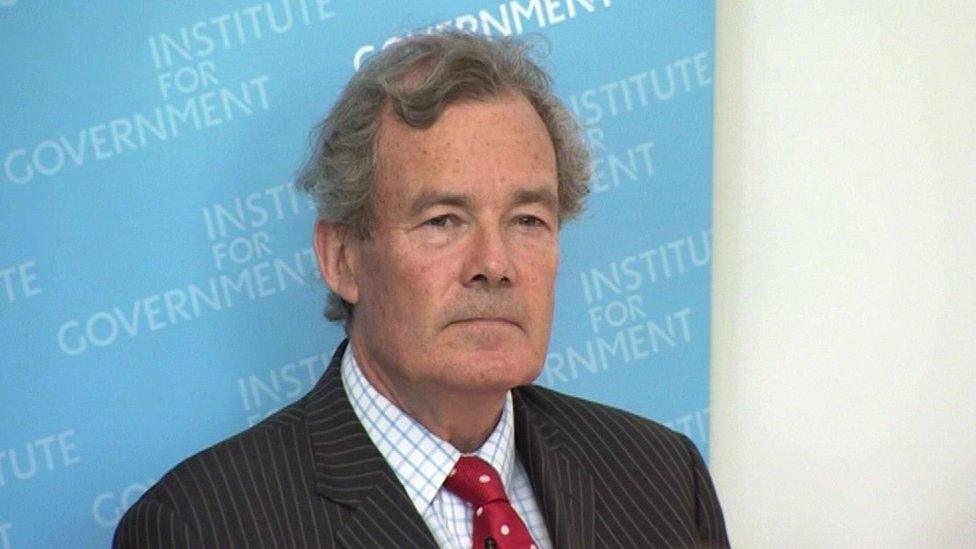Alex Allan: Patel inquiry head urges complaints process reform
- Published

Sir Alex, pictured here in 2012, quit as Boris Johnson's independent adviser on the ministerial code
The process for investigating allegations against ministers would benefit from greater independence, the PM's former standards adviser has said.
Sir Alex Allan, who quit after his bullying inquiry into Home Secretary Priti Patel was overruled, called for the role to be handed greater powers.
He said there was a case for allowing the adviser to launch their own probes into members of the government.
The current system risked damaging public confidence, he added.
At the moment, investigations into whether ministers have breached the code governing their conduct can only be launched by the prime minister.
As Boris Johnson's independent adviser on ministers' conduct, Sir Alex led an investigation into bullying allegations against Ms Patel, which she denies.
In November, he found, external she had broken the code, finding her approach "on occasions has amounted to behaviour that can be described as bullying in terms of the impact felt by individuals."
However his conclusion was rejected by Mr Johnson, who said he did not think Ms Patel was a bully and kept her in post.
Ministers are normally expected to resign if they break the code - which the prime minister has ultimate power to decide.
Ms Patel said she was "sorry if I have upset people in any way whatsoever - that was completely unintentional."
The FDA union, which represents senior civil servants, has launched legal action to try to get Mr Johnson's decision overturned at the High Court.

Priti Patel said she was not "supported" - at the time claims were made - by her department.
Giving evidence to the Committee on Standards in Public Life, Sir Alex - who was not questioned about specific cases - said there was a case for allowing the standards chief to conduct their own investigations.
"There have been incidents which prima facie appear to involve a breach of the code, but which haven't been referred to the independent adviser," he said.
"It is perfectly possible that the allegations weren't supported by the facts," he added.
"But the way the allegations have been dismissed I think has raised questions about the operation of the system and about the confidence that the public can have in the impact and effectiveness of the code."
"To that extent, I do see a case for introducing a greater element of independence."
Giving evidence to the same committee, Dave Penman, the general secretary of the FDA, said the ministerial code was "not fit for purpose".
He added there should be a separate process to deal with complaints relating to behaviour as opposed to other ministerial issues, such as conflicts of interest.
"When you are talking about bullying, or harassment, or potentially sexual harassment, it needs a very different process to deal with," he said.

What is the ministerial code?
Government document setting out "expected standards" of behaviour in office, including "consideration and respect" for civil servants and other colleagues
Ministers are normally expected to resign if they are found to have broken the code
Ministers who have stepped down include Liam Fox, over taking a friend and lobbyist on official trips, and Mark Field, who grabbed a climate protester
The code has existed since the Second World War but was not made public until 1992
